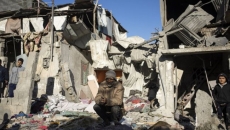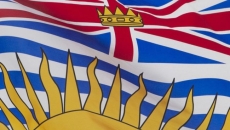When the sun goes down, the rats of Vancouver's Burrard Skytrain Station emerge, in a scurrying blur of fur and whipping tails.
Dozens of them, large and small, scamper around a park in front of the downtown station, running up and down the stairs among the legs of commuters and a wary reporter.
Some appear to be feasting on birdseed scattered on the ground.
Pest control experts suggest the skin-crawling scene may be due to a provincial ban on a type of rat poison, as well as other factors including Vancouver's unusually warm winter.
Ashley Cochrane with Vancouver pest control firm The X-Terminators said she had watched a video of the rat "party" that unfolds in Art Phillips Park.
“Unfortunately, it’s definitely not good to see that, you know, for them to be so brazen … it’s a shock,” said Cochrane.
She said rodent-related services have become a bigger part of their business lately.
“I speak with a lot of people on the phone and the consensus is we've never had this problem before and now there's just a lot more activity that we're seeing,” said Cochrane.
Bill Rough, a pest control specialist with Surrey-based Advance Pest Control, said he recently responded to a rat infestation in a downtown Vancouver duplex.
He set 30 to 40 traps. But within half an hour, he got a call from the customer saying they'd heard the traps going off.
“I came back and there were nine rats in the traps … and they were the size of a small cat,” said Rough.
He said rat-related calls have gone up 30 to 40 per cent in the past 18 months. "It has been gripping crazy lately," said Rough.
In January 2023, the province banned some types of anticoagulant rodenticides, saying they posed a risk to animals that eat poisoned rodents, such as hawks, and owls.
Pets or children could also be at risk, the government said, and only “essential services” such as hospitals and food production facilities were exempted.
Rough said the ban was one of the main reasons for the increase in rat activity in the Lower Mainland.
He said the government should “tweak” the policy by allowing people to use the banned rodenticide with caution in infested areas.
“I don’t see why that would be a problem (but) that’s not my decision, unfortunately,” said Rough.
Jason Page, general manager with Solutions Pest Control, said many factors contributed to the increase in rodent activity, including the poison ban, milder winter temperatures providing better breeding cycles, increased food availability from backyard chicken coops and restaurant patios, and increased urban development.
Page said the poison ban was “well-intentioned."
“However, with every action, there is always a reaction. In this case, the apparent reaction we are seeing appears to be a 50 per cent increase in rats and mice,” said Page.
Jay McIntyre, a service supervisor with Solutions Pest Control who oversees rodent work in Greater Vancouver, said he had also seen a video of the rats outside Burrard station.
“It’s not normal, but it doesn’t come as a surprise,” said Mclntyre.
He's been in the pest control industry since 1996 — he said one of his career highlights was trapping 65 rats in one house.
Mclntyre said his company has seen a “steady increase” of about 50 per cent in calls about rats in the past several years.
Although pest control companies are confident about the spike in rodent activity in Metro Vancouver, most municipal authorities lack hard data.
The cities of Surrey, Richmond and New Westminster said they don't have data on rat-related calls
However, a City of Vancouver spokesperson said they received 1,174 calls about rats on the city's 3-1-1 phone line last year, compared to 1,141 in 2022.
Kaylee Byers is a senior scientist with the Pacific Institute on Pathogens, Pandemics and Society at Simon Fraser University, who also calls herself a "rat detective."
She said the lack of a comprehensive system for rat sightings makes it hard for wildlife biologists to tell if populations are growing.
“The thing is, nobody actually knows and that's because we don't have any form of municipal systematic reporting system for rats and rat sightings in the city,” said Byers.
“The best thing we have is sort of anecdotal evidence, which is calls to pest control professionals, but that data is not perfect because not everybody will call a pest control professional."
In 2013, Byers joined the Vancouver Rat Project, an attempt to monitor and study rat movements around the city. Her team once captured more than 700 rats in the Downtown Eastside neighbourhood.
She said cities in B.C. should follow the lead of rat-free provinces, like Alberta, as well as invest in rat management programs tailored differently to every city based on its rat populations.
“Rats are a part of our cities, and managing them is a complex issue," she said.
“Part of the problem is that we're approaching it like it's a simple one. See a rat, remove a rat, or kill a rat, and it's not working. We need to think more broadly, we need to address it as a complex issue in order to come up with innovative and multiple solutions to managing rats now and in the future."






